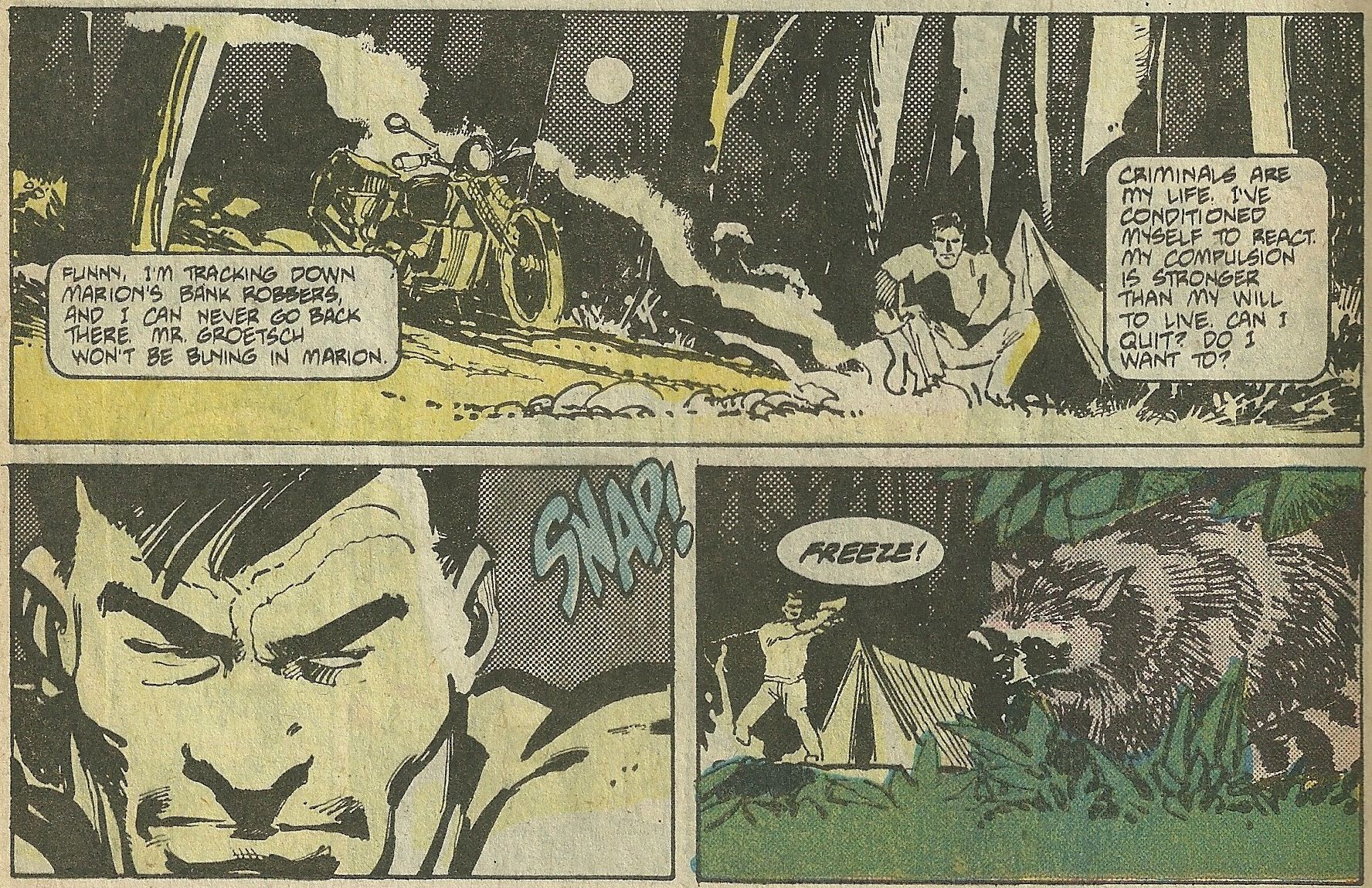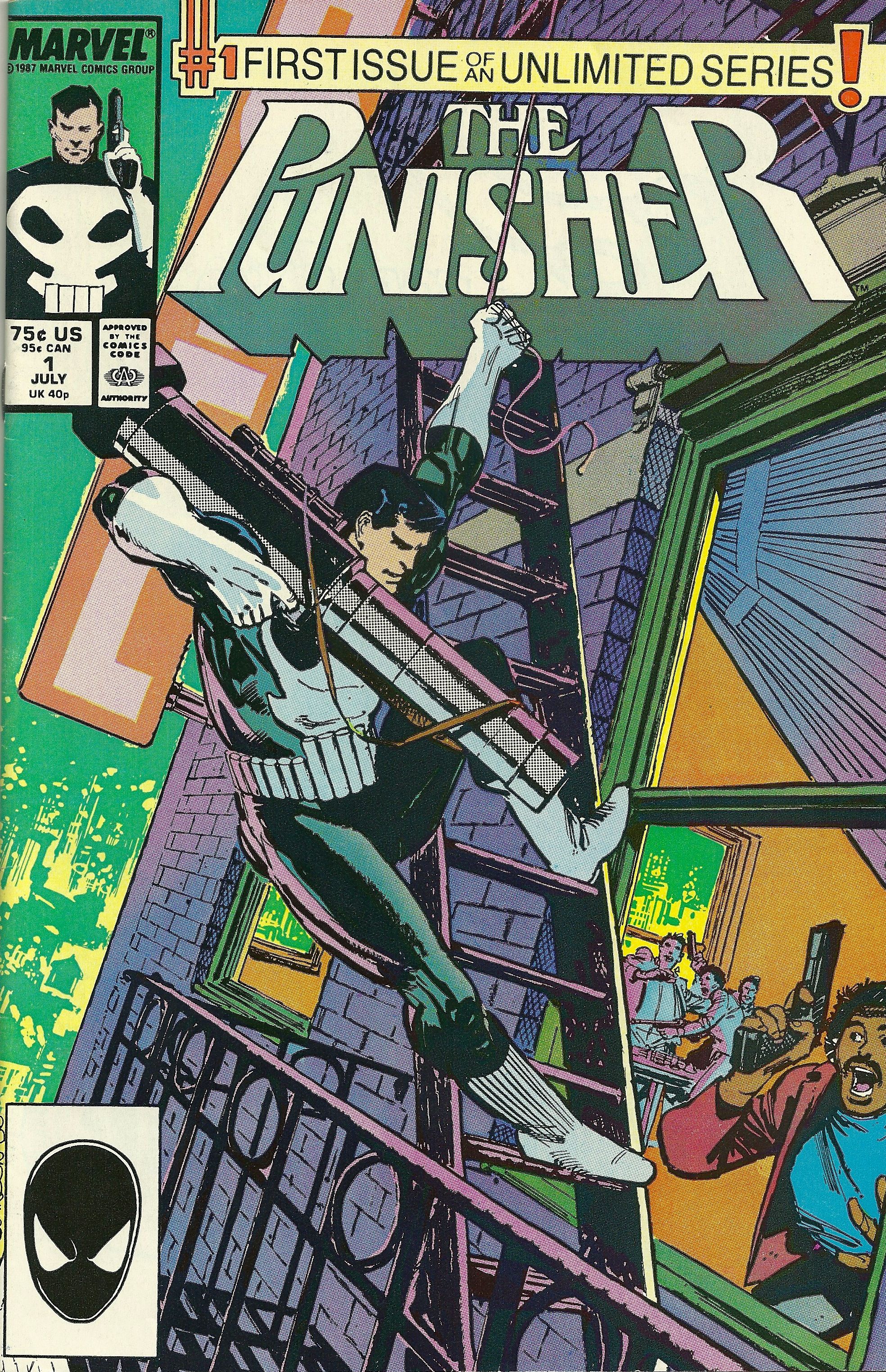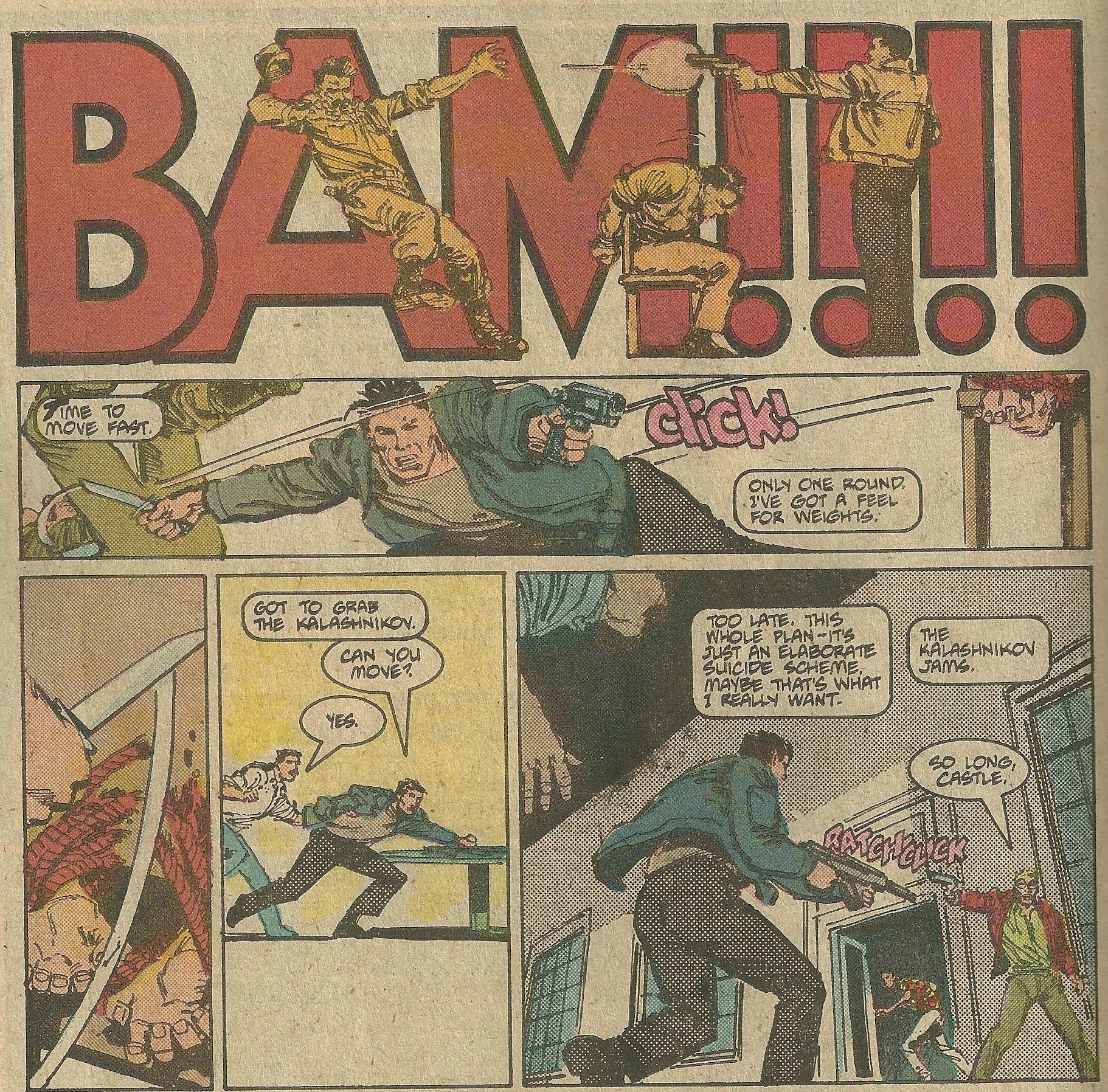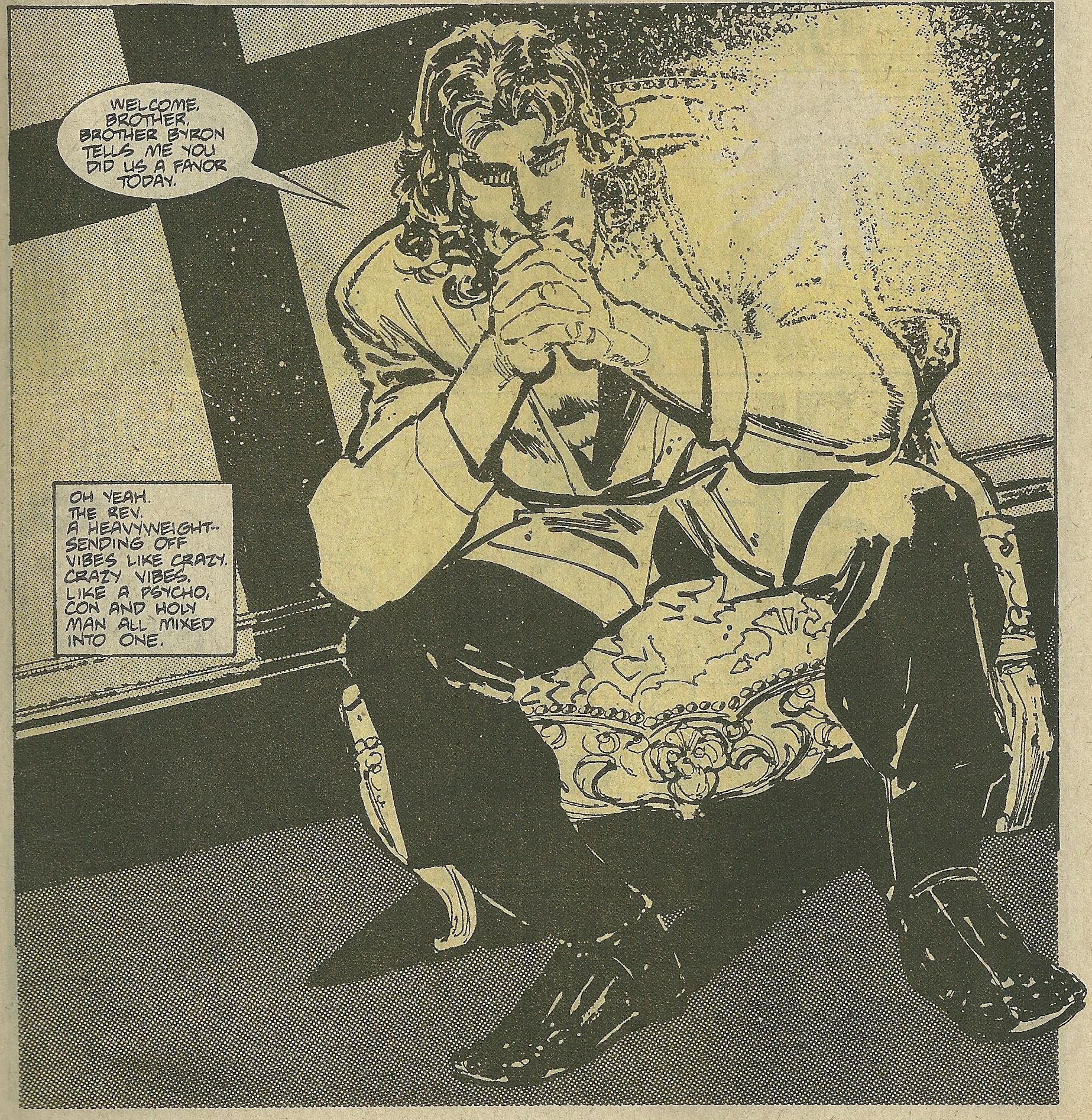A column in which Matt Derman (Comics Matter) reads & reviews comics from 1987, because that’s the year he was born. Click here for an archive of all the previous posts in the series.
The Punisher #1-4 (Marvel) by Mike Baron, Klaus Janson, James Novak (#1), Ken Bruzenak (#2-4), Carl Potts
I've never been crazy about the Punisher. It's not his morality (or lack thereof) I object to, though admittedly I do prefer it if my superheroes try to avoid using fatal tactics. Although...I guess he's not a superhero in the strictest sense because he has no powers, but he wears a costume and has a codename and hangs out with lots of other Marvel super-folks, so I think the label still applies. At any rate, what has historically turned me off about the Punisher is that he's seemed too simple to me, too one-note. Even the Hulk, a literal embodiment of instinctual rage, turns back into Bruce Banner sometimes, and thus has multiple facets to his personality. Frank Castle is always the Punisher and vice versa, his violent hatred for crime never subsiding or even being hidden under the mask of a secret identity. He's so narrowly and determinedly focused on his personal war, it has never felt to me like he allows for much room for any storytelling beyond locating the next battle, the next villain to slay. I'm sure every creative team finds (or tries to find) their own angle, a way to freshen or expand Castle's character and world so that he isn't just the pissed off guy with huge guns all the time. Nonetheless, that's the way he's come across whenever I've encountered him in the past, and it has consistently failed to capture my interest.
Mike Baron and Klaus Janson's The Punisher, which marks the first time the character ever had his own ongoing series, somehow manages to play up the single-mindedness I thought I disliked in Castle, yet still be a comicbook I enjoy. A lot of that is Janson, who does all the art from pencils to colors, producing strong work with several breakout panels over the course of these first four issues. Credit where it's due, though, Baron writes Punisher as a man who's not necessarily pleased with the life he's chosen for himself, but commits to it 100% anyway, and that's an approach I can get into. In his rare moments of self-reflection, Castle points out the same problems I just did above, namely that his life has no room for anything other than fight after fight after fight. He doesn't exactly struggle with that, but he is at least aware of it, and somehow that tiny bit of acknowledgement, combined with Janson's visuals, sold me on a hero I'd always avoided before.
I don't want to portray this version of Castle as especially thoughtful or psychologically analytical. On the contrary, his narration consists primarily of tactical assessments and light sarcasm, as opposed to any deep self-examination. Baron doesn't go too far below Frank's surface, because Frank doesn't allow himself to go there, either. If he did explore his neglected feelings, his loneliness and depression and who knows what else he's been carrying around since the death of his family, it would probably stop him in his tracks. He has to put up a tough front for himself in order to maintain the even tougher front he presents to the rest of the world as the Punisher, and I suppose that's why Baron's interpretation clicked for me. Without talking about it explicitly, Baron manages to shine a light on why the Punisher has to be somewhat one-dimensional, because his other dimensions would get in the way of what he's trying to do, who he's trying to be. Brooding, self-pitying, tortured heroes have their place (see Batman, Daredevil, et al) but Punisher has chosen to be all action, and surely that has its place, too. It requires him to zero in on his fury and ignore whatever else he might be tempted to feel, and though there's absolutely no doubt that's an unhealthy way to live, it is interesting to watch from the outside. I guess what I'm saying is, I used to not like the Punisher because I thought he was overly simple, but Baron showed me that it's a somewhat false simplicity, that Castle is just as complex and conflicted as any other human being, but deliberately decided not to let himself appear or behave that way when he chose a life of vigilantism.
At one point in issue #3, Castle finds himself camping in the woods, partway between Missouri and Kansas, on his way to confront yet another criminal who had the misfortune of getting the Punisher's attention. Staring into his campfire, Castle sums up in a few sentences what I've been trying to explain for more than a paragraph: "Criminals are my life. I've conditioned myself to react. My compulsion is stronger than my will to live. Can I quit? Do I want to?" That's the closest to openly doubting himself Frank ever gets, and it speaks volumes about everything he does throughout these issues. He can't help himself anymore; he's been the Punisher for long enough and with such complete commitment that it's basically all he knows now, whether he likes it or not. And part of that commitment means never truly questioning if he does want it. Even in the line I just quoted, it's a rhetorical question, a flight of fancy he allows himself in a moment of isolation. Also, as soon as he thinks it, a twig snaps behind him and, as he's taught himself to do too well, he responds with a threat of violence. In a rare gag for this series, the noise turns out to be a raccoon, but the point is still made—should Frank ever even toy with the idea of giving up Punishing, something will always pop up before long to bring him back.
The other standout example of Castle's mutual unwillingness and inability to get in touch with his emotions or do anything non-Punish-y comes at the beginning of issue #4. Castle and his arms supplier Martin get ambushed, and Martin is killed immediately in a hail of gunfire. It's not as if Frank and Martin were necessarily all that close, but it's clear in the one page of life Martin gets that they have a certain affinity for one another, that they trust and rely on each other. Castle is comfortable around Martin, relaxed in a way he rarely is, so even if they're not best friends, Martin's sudden death must've had an impact. If it did, though, we'll never hear about it, because as soon as the bullets start flying, Castle goes into full-on Punisher mode, crouching down in the car with his gun drawn, waiting for twenty tense, silent minutes until the enemy finally exposes his position. It's all strategy and hard-boiled snark from Castle's captions, nothing about Martin except for the simple fact that he died. I wasn't expecting a weepy eulogy, but it's telling that Frank's reaction is all detached battle planning, because we know that somewhere deep down he must be having a more emotional response to the loss of, if not a friend, at least an ally, one of the few people in this world who didn't deserve Punishing. Once again, Baron shows the reader how Castle is somewhat trapped by his own crimefighting crusade, because that's the part of him that always ultimately has control.
With the inescapable and incessant violence in Frank's life, it's a good thing Klaus Janson does such solid work when it comes to drawing action. He can make a single significant gunshot really count, but is just as good when Punisher unleashes a classic barrage of wild shooting. Janson also might do the best pained/shocked faces I've ever seen. It's the way he shapes the mouths, perfectly wide but also pseudo-rectangular, making them look more strained and fittingly unnatural. He's clever with angles, too, able to move all around a scene, often zooming way in and out from panel to panel without ever breaking the flow of the sequence.
One of the best contributions Janson makes to this particular series is his superbly smug villains. They're so satisfied with their own wickedness, you come to really enjoy watching Castle put them in their place. Considering that's how Castle spends most of his time and energy, it's important that Janson make it count.
As it should be, the one thing Janson draws slightly better than all the rest is the Punisher himself. Janson's Punisher looks like he's made of bricks, yet he's still quite mobile. He's thick from head to toe, and he borders on being larger than life, but Janson doesn't quite cross that line. He keeps Castle just realistic enough to look human, but a human who has pushed himself to the limits of healthy bulk. You believe he can handle the ridiculously large weapons he carries, and that he's fit and agile enough to pull off the various action stunts he attempts in every issue. Janson gives Castle a certain smugness, too, but it's distinct from that of his foes, more subdued and less antagonizing. Frank's smugness is for himself, whereas the villains are broadcasting it to the world, a defiant challenge to Castle's quiet self-confidence.
The first time we see the Punisher in full costume and gear is a hard page to forget, and Janson has a couple such memorable panels in every issue. There's a legitimately unnerving rattlesnake attack, a boss villain being burned alive, two different shots of Punisher unloading an automatic weapon on a bunch of low-level baddies, and my personal favorite, the introduction of the Reverend Samuel Smith. It's a chilling image, the Rev backlit intensely and striking the traditional pose of the scheming antagonist. I especially like that Janson uses a near-white yellow for that scene, because it's kind of a hard color to look at, harsh on the eyes, tough to pin down or study for long. The Rev is similar as a character and as an opponent for Castle, who finds Smith difficult to entirely understand or anticipate.
The Rev is the primary villain of The Punisher #4, and his arc continues into #5 as well, though I didn't read that since it's cover dated January 1988. Even without knowing the conclusion, the story with the Rev was easily my favorite, because the series got better with each installment, and I got proportionally more invested in it as I read along. It only took Janson and Baron four issues to take me from largely bored by the idea of the Punisher to genuinely interested in what makes him tick, and I was actually kind of upset when I got to the end of issue #4 and realized I wouldn't be finishing the Rev narrative before writing this review. I wanted more Punisher, which is something I've never felt before, and while he is by no means my new favorite character, I'm glad now to have a much better sense of and appreciation for his appeal and potential.




